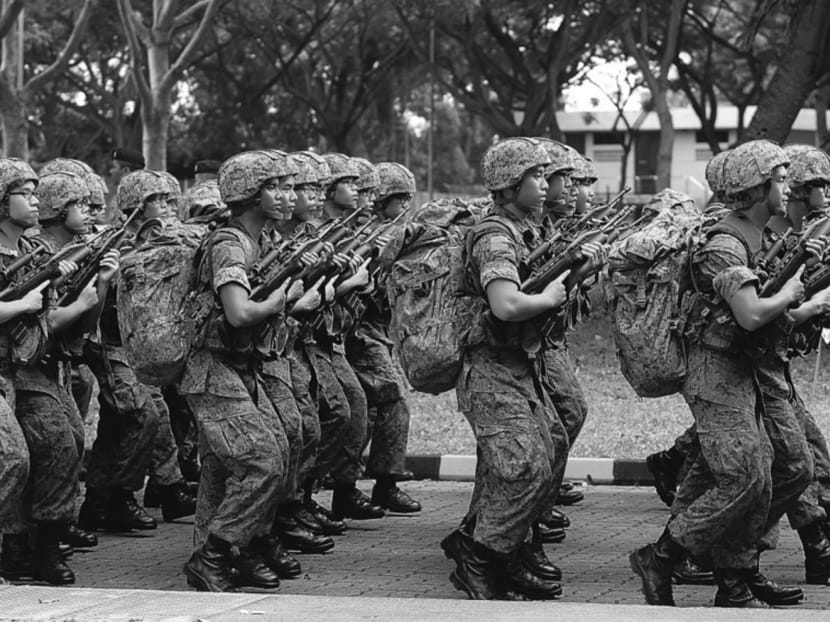The evolution of NS and its relevance to Singapore
Today marks the 50th anniversary of the day National Service (NS) was introduced in post-independence Singapore. On March 14, 1967, Parliament passed the National Service (Amendment) Bill after then-Defence Minister Goh Keng Swee moved it for a second reading.

National Service has undergone many changes since its inception, in tandem with the evolving population and society. TODAY file photo
Today marks the 50th anniversary of the day National Service (NS) was introduced in post-independence Singapore. On March 14, 1967, Parliament passed the National Service (Amendment) Bill after then-Defence Minister Goh Keng Swee moved it for a second reading.
It marked the beginning of a mission to build a credible defence force based on the conscription of male youths, as a key pillar of our young country’s nation-building journey.
Along with the broader Singapore Armed Forces (SAF), NS has undergone many changes since its inception, in tandem with the growing and evolving population and society.
One of the most recent efforts in the never-ending process of ensuring that NS remains relevant and ready to meet current and future challenges was the launch of the Committee to Strengthen National Service (CSNS) in 2013.
Comprising two working groups and a steering committee helmed by Defence Minister Ng Eng Hen, CSNS brought together individuals from diverse walks of life and backgrounds to ensure a robust examination of the changing demands on NS.
After a year of work which included numerous consultations and studies of NS policies past and present, as well as discussions on how the NS system could be strengthened to better serve Singapore and Singaporeans in the future, the end result was a report comprising 30 recommendations of changes to the NS system.
This review was unprecedented in the history of NS, and all its recommendations were accepted by the Government. Some, such as the NS Mark accreditation scheme which recognises organisations that support NS through its policies and human resource practices, have already taken effect and are having an impact in building broader support for NS.
Others, such as the option for pre-enlistees to indicate which vocations they are interested in joining when they enlist for NS, which was implemented late last year, have also generated much interest.
This move to encourage full-time national servicemen to take ownership of their roles and responsibilities could go a long way to make the NS experience a more fulfilling one for future generations of servicemen.
As we build towards NS100, there will be a need for continued evolution and adaptation, especially given the changing threat environment facing the world and Singapore.
Rising threats of extremist terrorism and cyber attacks, among others, will pose challenges for our national defence infrastructure in the future.
The new cyber command announced in Parliament earlier this month is one example of how the Defence Ministry is preparing to meet these challenges and tap the operationally ready national servicemen (NSmen) to play a key role.
But as we continue the transition which has seen Singapore’s military move from first generation to third, and now with an eye on the “Next Generation SAF”, there are other considerations to keep in mind.
First, there could be pressures to shape the NS experience in line with the desires of future generations.
This will build on the good work done by the CSNS, but also runs the risk of allowing a critical institution to be shaped by popular forces, which may not always be in line with broader national interests such as security and stability.
Military action, especially in times of real conflict, is difficult and oftentimes dangerous work. It requires trained men and women to stand in harm’s way and to defend their land with their lives, if necessary, against aggressors.
Physical and mental fitness, technical and tactical skills, and the conviction and confidence to stand up to clear and present danger are traits that can only be honed under tough and challenging conditions, and the NS experience must reflect that.
At the same time, the realities of modern life, the pressures and demands of the future economy and family life are all factors that weigh on our NSmen.
The NS of the future needs to balance these and ensure that, for example, the periodic In-Camp Trainings do not become unbearable burdens for those trying to manage family and work commitments.
But it is also worth remembering that there are benefits to be derived from the NS experience.
Many young men and women who have gone through the rigours of two (or two-and-a-half) compulsory years in uniform, myself included, would have learnt something about enduring hardship, or at the very least some level of discomfort.
Knowing that things may not always go the way you like, but also learning that it is possible to overcome this, creates the perfect conditions to acquire the elusive trait of resilience that is so highly prized in the fast-changing and disruptive environment we are already facing today.
We also learn to live away from home, with others who may be total strangers, in environments not of our own choosing.
When viewed in this light, NS can be the training ground for the kind of Singaporean who will be able to face an uncertain future with quiet confidence and self-belief, which will continue to stand Singapore in good stead in the years to come.
ABOUT THE AUTHOR:
Nicholas Fang is the executive director of the Singapore Institute of International Affairs, and a member of the Support for NS working group of the Committee to Strengthen National Service. He also serves as a Major (NS) on the Reservist on Voluntary Extended Reserve Service scheme.






